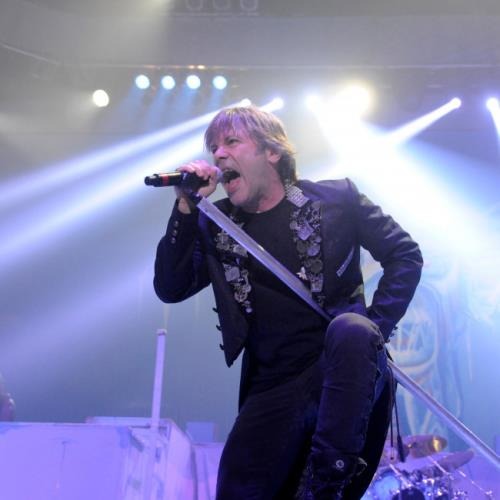Uncategorized
Bruce Dickinson Lost His Singing Voice After Undergoing Cancer Treatment

Bruce Dickinson Lost His Singing Voice After Undergoing Cancer Treatment
The Voice That Defined a Generation
When you think of Iron Maiden, one sound rises above the thunder of guitars and the galloping drums: Bruce Dickinson’s soaring voice. His operatic, larger-than-life delivery transformed metal anthems into cultural milestones. Yet behind the legend lies a story of vulnerability—how cancer treatment once took away the very thing that defined him: his singing voice.
A Battle Beyond the Stage: Bruce Dickinson’s Cancer Diagnosis
In 2015, Bruce Dickinson shocked fans worldwide by revealing he was undergoing treatment for throat cancer. For a man whose entire career hinged on vocal power, the diagnosis struck like a hammer blow. The treatments were grueling—radiation sessions that scorched his throat, a painful process that stripped away not just his strength, but his ability to sing.
The Moment of Silence
For months, Dickinson couldn’t do the very thing that made him iconic. His once-mighty range was reduced to whispers. For fans, the fear was palpable: would we ever hear him command an arena again? For Dickinson, it was a test of willpower—an identity crisis wrapped inside a health battle.
The Long Road Back to Singing
Recovering from throat cancer is no small feat. Radiation burns tissue, scars muscle, and leaves long-lasting effects on the delicate mechanics of the voice. Dickinson had to relearn how to sing—step by painful step. Breathing exercises, vocal therapy, and endless patience became his new regimen.
Reinventing the Voice
Interestingly, Dickinson later shared that his voice had actually changed post-recovery. Though he initially “lost” it, what emerged after years of rebuilding was a deeper, richer timbre. Fans noticed it too: Iron Maiden’s tours post-2015 carried an extra weight in his vocals, a resonance shaped not just by technique but by survival.
Bruce Dickinson’s Influence on Rock and Metal
Even during his silence, Dickinson’s cultural impact never faded. His career wasn’t only about music—he’s a commercial pilot, author, and motivational speaker. Yet his story of losing and regaining his voice elevated him from rock star to living symbol of resilience.
Why His Voice Mattered So Much
Dickinson wasn’t just another metal singer. His style bridged the gap between classical theater and heavy rock. Songs like Hallowed Be Thy Name and The Trooper aren’t just tracks—they’re performances, elevated by the voice that could command both stadiums and headphone listeners alike.
Iron Maiden’s Triumphant Return to the Stage
When Iron Maiden launched The Book of Souls World Tour in 2016, it wasn’t just a tour—it was a victory lap. Fans filled arenas across the globe, not knowing what to expect from Dickinson’s post-cancer voice. What they got was nothing short of astonishing: a man who not only reclaimed his voice but delivered with renewed fire.
Travel and Tour Tips for Fans
If you’re planning to catch Iron Maiden—or Dickinson’s solo projects—on tour today, here are some essentials:
- How to Get There: Major tours often hit cities like London, New York, São Paulo, and Tokyo. Booking flights early saves money, and public transport is usually the easiest way to reach stadium venues.
- Where to Stay: Look for hotels or guesthouses near the venue. Budget travelers might find great options on platforms like Hostelworld or Airbnb, while high-end fans can enjoy premium stays within walking distance of the arena.
- Local Culture: Every Iron Maiden concert is more than a show—it’s a gathering of a global tribe. Arrive early, soak in the fan energy, and don’t forget to check out local record stores for rare Maiden vinyl.
Lessons from Bruce Dickinson’s Journey
Bruce Dickinson’s battle with cancer and the loss of his voice underscores a powerful truth: even legends are human. But his comeback also proves that reinvention is possible, even after devastating loss. For musicians, fans, and dreamers alike, his story is a rallying cry—never underestimate resilience.
Final Thoughts: The Voice That Refuses to Be Silenced
Bruce Dickinson may have temporarily lost his voice, but what he gained was something even greater: perspective, strength, and an even deeper connection with his fans. His story reminds us that music isn’t just about sound—it’s about spirit.
Are you ready to witness the power of resilience in action? Don’t miss the next Iron Maiden tour dates. Because when Bruce Dickinson sings now, he doesn’t just hit notes—he tells the story of survival.
